
Fair use is a doctrine in United States law that permits limited use of copyrighted material without having to first acquire permission from the copyright holder. Fair use is one of the limitations to copyright intended to balance the interests of copyright holders with the public interest in the wider distribution and use of creative works by allowing as a defense to copyright infringement claims certain limited uses that might otherwise be considered infringement. The U.S. "fair use doctrine" is generally broader than the "fair dealing" rights known in most countries that inherited English Common Law. The fair use right is a general exception that applies to all different kinds of uses with all types of works. In the U.S., fair use right/exception is based on a flexible proportionality test that examines the purpose of the use, the amount used, and the impact on the market of the original work.
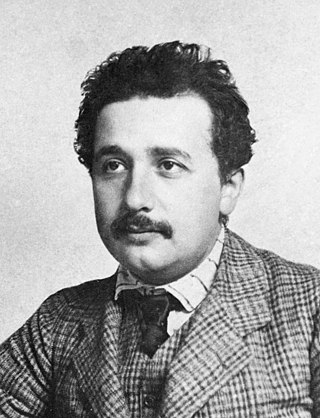
In physics, the special theory of relativity, or special relativity for short, is a scientific theory of the relationship between space and time. In Albert Einstein's 1905 paper, On the Electrodynamics of Moving Bodies, the theory is presented as being based on just two postulates:
- The laws of physics are invariant (identical) in all inertial frames of reference. This is known as the principle of relativity.
- The speed of light in vacuum is the same for all observers, regardless of the motion of light source or observer. This is known as the principle of light constancy, or the principle of light speed invariance.

The First Amendment to the United States Constitution prevents Congress from making laws respecting an establishment of religion; prohibiting the free exercise of religion; or abridging the freedom of speech, the freedom of the press, the freedom of assembly, or the right to petition the government for redress of grievances. It was adopted on December 15, 1791, as one of the ten amendments that constitute the Bill of Rights. In the original draft of the Bill of Rights, what is now the First Amendment occupied third place. The first two articles were not ratified by the states, so the article on disestablishment and free speech ended up being first.

The Fourth Amendment to the United States Constitution is part of the Bill of Rights. It prohibits unreasonable searches and seizures and sets requirements for issuing warrants: warrants must be issued by a judge or magistrate, justified by probable cause, supported by oath or affirmation, and must particularly describe the place to be searched and the persons or things to be seized.

The Fourteenth Amendment to the United States Constitution was adopted on July 9, 1868, as one of the Reconstruction Amendments. Usually considered one of the most consequential amendments, it addresses citizenship rights and equal protection under the law and was proposed in response to issues related to formerly enslaved Americans following the American Civil War. The amendment was bitterly contested, particularly by the states of the defeated Confederacy, which were forced to ratify it in order to regain representation in Congress. The amendment, particularly its first section, is one of the most litigated parts of the Constitution, forming the basis for landmark Supreme Court decisions such as Brown v. Board of Education (1954) regarding racial segregation, Loving v. Virginia (1967) regarding interracial marriage, Roe v. Wade (1973) regarding abortion, Bush v. Gore (2000) regarding the 2000 presidential election, Obergefell v. Hodges (2015) regarding same-sex marriage, and Students for Fair Admissions v. Harvard (2023) regarding race-based college admissions. The amendment limits the actions of all state and local officials, and also those acting on behalf of such officials.

The Supreme Court of the United States (SCOTUS) is the highest court in the federal judiciary of the United States. It has ultimate appellate jurisdiction over all U.S. federal court cases, and over state court cases that turn on questions of U.S. constitutional or federal law. It also has original jurisdiction over a narrow range of cases, specifically "all Cases affecting Ambassadors, other public Ministers and Consuls, and those in which a State shall be Party." In 1803, the Court asserted itself the power of judicial review, the ability to invalidate a statute for violating a provision of the Constitution via the landmark case Marbury v. Madison. It is also able to strike down presidential directives for violating either the Constitution or statutory law.

In mathematics and physics, a vector space is a set whose elements, often called vectors, can be added together and multiplied ("scaled") by numbers called scalars. The operations of vector addition and scalar multiplication must satisfy certain requirements, called vector axioms. Real vector spaces and complex vector spaces are kinds of vector spaces based on different kinds of scalars: real numbers and complex numbers. Scalars can also be, more generally, elements of any field.

Voltage, also known as (electrical) potential difference, electric pressure, or electric tension is the difference in electric potential between two points. In a static electric field, it corresponds to the work needed per unit of charge to move a positive test charge from the first point to the second point. In the International System of Units (SI), the derived unit for voltage is the volt (V).

The volt is the unit of electric potential, electric potential difference (voltage), and electromotive force in the International System of Units (SI).
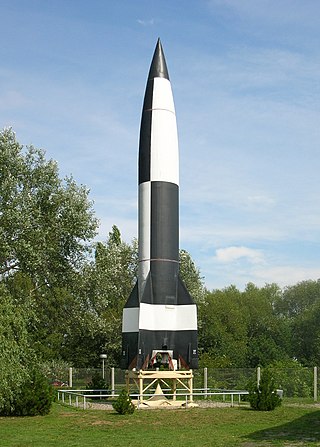
The V2, with the technical name Aggregat 4 (A4), was the world's first long-range guided ballistic missile. The missile, powered by a liquid-propellant rocket engine, was developed during the Second World War in Nazi Germany as a "vengeance weapon" and assigned to attack Allied cities as retaliation for the Allied bombings of German cities. The V2 rocket also became the first artificial object to travel into space by crossing the Kármán line with the vertical launch of MW 18014 on 20 June 1944.
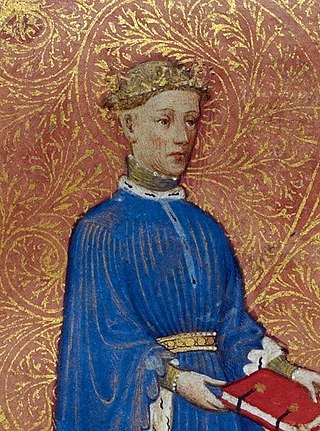
Henry V, also called Henry of Monmouth, was King of England from 1413 until his death in 1422. Despite his relatively short reign, Henry's outstanding military successes in the Hundred Years' War against France made England one of the strongest military powers in Europe. Immortalised in Shakespeare's "Henriad" plays, Henry is known and celebrated as one of the greatest warrior-kings of medieval England.

Thoroughgood "Thurgood" Marshall was an American civil rights lawyer and jurist who served as an associate justice of the Supreme Court of the United States from 1967 until 1991. He was the Supreme Court's first African-American justice. Prior to his judicial service, he was an attorney who fought for civil rights, leading the NAACP Legal Defense and Educational Fund. Marshall was a prominent figure in the movement to end racial segregation in American public schools. He won 29 of the 32 civil rights cases he argued before the Supreme Court, culminating in the Court's landmark 1954 decision in Brown v. Board of Education, which rejected the separate but equal doctrine and held segregation in public education to be unconstitutional. President Lyndon B. Johnson appointed Marshall to the Supreme Court in 1967. A staunch liberal, he frequently dissented as the Court became increasingly conservative.
Roe v. Wade, 410 U.S. 113 (1973), was a landmark decision of the U.S. Supreme Court in which the Court ruled that the Constitution of the United States protected a right to have an abortion. The decision struck down many abortion laws, and it sparked an ongoing abortion debate in the United States about whether, or to what extent, abortion should be legal, who should decide the legality of abortion, and what the role of moral and religious views in the political sphere should be. The decision also shaped debate concerning which methods the Supreme Court should use in constitutional adjudication.

Charles V was Holy Roman Emperor and Archduke of Austria from 1519 to 1556, King of Spain from 1516 to 1556, and Lord of the Netherlands as titular Duke of Burgundy from 1506 to 1555. He was heir to and then head of the rising House of Habsburg. His dominions in Europe included the Holy Roman Empire, extending from Germany to northern Italy with rule over the Austrian hereditary lands and Burgundian Low Countries, and Spain with its possessions of the southern Italian kingdoms of Naples, Sicily and Sardinia. In the Americas, he oversaw the continuation of Spanish colonization and a short-lived German colonization. The personal union of the European and American territories he ruled was the first collection of realms labelled "the empire on which the sun never sets".
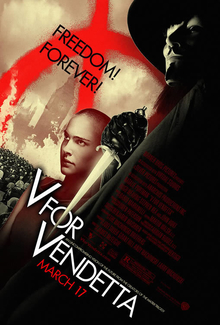
V for Vendetta is a 2005 dystopian political action film directed by James McTeigue from a screenplay by the Wachowskis. It is based on the 1988–89 DC Vertigo Comics limited series of the same title by Alan Moore, David Lloyd, and Tony Weare. The film, set in a future where a fascist totalitarian regime has subjugated the UK, centres on V, an anarchist and masked freedom fighter who attempts to ignite a revolution through elaborate terrorist acts, and on Evey Hammond, a young woman caught up in V's mission. Stephen Rea portrays a detective leading a desperate quest to stop V.

John Glover Roberts Jr. is an American jurist serving since 2005 as the 17th chief justice of the United States. He has been described as having a moderate conservative judicial philosophy, though he is primarily an institutionalist. Regarded as a swing vote in some cases, Roberts has presided over an ideological shift toward conservative jurisprudence on the high court, in which he has authored key opinions.
In linear algebra, an eigenvector or characteristic vector is a vector that has its direction unchanged by a given linear transformation. More precisely, an eigenvector, , of a linear transformation, , is scaled by a constant factor, , when the linear transformation is applied to it: . The corresponding eigenvalue, characteristic value, or characteristic root is the multiplying factor .
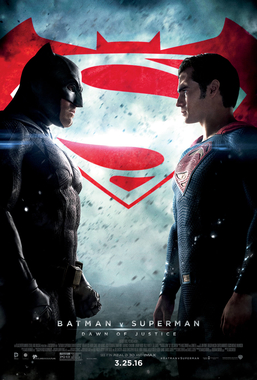
Batman v Superman: Dawn of Justice is a 2016 American superhero film based on the DC Comics characters Batman and Superman. Produced by Warner Bros. Pictures, RatPac-Dune Entertainment, DC Entertainment, Atlas Entertainment, and Cruel and Unusual Films, and distributed by Warner Bros., it is a follow-up to the 2013 film Man of Steel and the second film in the DC Extended Universe (DCEU). The film was directed by Zack Snyder, written by Chris Terrio and David S. Goyer, and features an ensemble cast that includes Ben Affleck as Batman and Henry Cavill as Superman, alongside Amy Adams, Jesse Eisenberg, Diane Lane, Laurence Fishburne, Jeremy Irons, Holly Hunter, and Gal Gadot. Batman v Superman: Dawn of Justice is the first live-action film to feature Batman and Superman together, as well as the first live-action cinematic portrayal of Wonder Woman. In the film, criminal mastermind Lex Luthor manipulates Batman into a preemptive battle with Superman, who Luthor is obsessed with destroying.

Grand Theft Auto V is a 2013 action-adventure game developed by Rockstar North and published by Rockstar Games. It is the seventh main entry in the Grand Theft Auto series, following 2008's Grand Theft Auto IV, and the fifteenth instalment overall. Set within the fictional state of San Andreas, based on Southern California, the single-player story follows three protagonists—retired bank robber Michael De Santa, street gangster Franklin Clinton, and drug dealer and gunrunner Trevor Philips, and their attempts to commit heists while under pressure from a corrupt government agency and powerful criminals. Players freely roam San Andreas's open world countryside and fictional city of Los Santos, based on Los Angeles.

Severe acute respiratory syndrome coronavirus 2 (SARS‑CoV‑2) is a strain of coronavirus that causes COVID-19, the respiratory illness responsible for the COVID-19 pandemic. The virus previously had the provisional name 2019 novel coronavirus (2019-nCoV), and has also been called human coronavirus 2019. First identified in the city of Wuhan, Hubei, China, the World Health Organization designated the outbreak a public health emergency of international concern from January 30, 2020, to May 5, 2023. SARS‑CoV‑2 is a positive-sense single-stranded RNA virus that is contagious in humans.
















